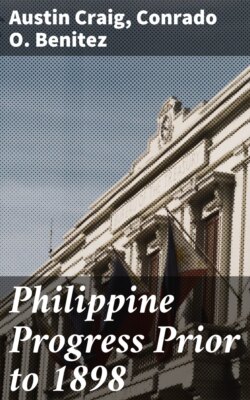Читать книгу Philippine Progress Prior to 1898 - Austin Craig - Страница 5
На сайте Литреса книга снята с продажи.
Need of more study of Philippine Economic Development.
ОглавлениеTable of Contents
The Spanish writers, and with them the Filipinos as well as, to a great extent, writers of Philippine treatises in other languages, have over-emphasized the political history of the Philippines. The history of this country has been regarded but as the history of the Spaniards in it, and not of its people, the Filipinos.1 Hence arises the need of studying our history from the point of view of the development of our people, especially to trace and show the part played by them in Philippine social progress as a whole.2
The study of the economic history of a country is important also because economic forces play a great part in the development of any people. Indeed, some claim that all history may be explained in terms of economic motives. This is known as the economic interpretation of history.3 Without going into the controversy centering around this theory, we can readily see that what we know as civilization has a two-fold basis, the physical and the psychical. And it is only after the physical basis is secured, that further psychical advance is possible. “Among all species, and in every stage of evolution, the extent of aggregation and its place or position are determined by external physical conditions. Even when men have become united by sympathies and beliefs, the possibility of perpetuating their union is a question of the character and resources of their environment. The distribution of food is the dominating fact. Animals and men dwell together where a food supply is found, or may be certainly and easily produced. Other physical circumstances of the environment, however, such as temperature and exposure, surface and altitude, which make life in some places comparatively easy, in others difficult or impossible, exert an influence not to be overlooked.” (Franklin Henry Giddings, The Principles of Sociology, p. 82. New York: 1911.)
We need not trace the history of early civilizations to show the influence exerted by physical factors. We need only to recall the motives, familiar to all, which led to the discovery of America, namely, the closing of the trade routes to the East through the conquest of the Turks. And the history of this country itself furnishes many illustrations. Both ancient and modern writers have had a good deal to say about the strategic position of the Philippine Islands in relation to the countries bordering around the Pacific Ocean.4 It was that central geographical position which explained the marked predominance of Manila as a trade depot over all the other ports in the Orient, at one time in our history. That was, furthermore, the reason why the Spaniards kept the country; they wanted to use it “as a means to be nearer, and to reach more quickly, the rich country of spices, and then the continent of Asia, Japan, and the Orient in general.”5
Finally, we should distinguish the various causes that explain historical events. For example, a good deal of what has been known as the religious question in this country, is not concerned with religion at all, but chiefly with economics. It is not always easy to distinguish these various causes; a fact which only goes to explain the one-sided point of view which has prevailed till the present. But, that the questions connected with the means of getting a living were considered paramount, even long before the formal exposition of the economic interpretation of history, may be seen from the words of the provincials of the religious orders in a remonstrance addressed to the governor and captain-general of the Philippines, wherein they depicted the deplorable conditions in the Islands:
“Third, all the Christian Indians would be more steadfast and rooted in the holy faith, and would become effective and most suitable instruments for (gaining) new conversions of infidels (and) apostates, the infidels themselves beholding the abundant wealth and profit, and other benefits, of the Christian Indians; FOR IT IS THE TEMPORAL WELFARE EVIDENT TO THEIR SENSES WHICH, AS EXPERIENCE TEACHES US, STRONGLY INFLUENCES BOTH CLASSES OF INDIANS, TO BE CONVERTED OR TO MAINTAIN THEMSELVES IN THE CHRISTIAN FAITH.”6
